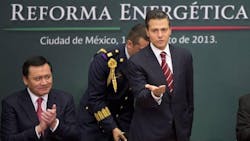This month Mexico signed substantial reforms into law.
“Mexico’s reform agenda is now complete. Eleven structural reforms were passed by congress over the past 20 months. [These] reforms intertwine in a single goal: to increase Mexico’s productivity and competitiveness,” wrote President Enrique Peña Nieto in the August 20 edition of the Financial Times.
In the aftermath of the crisis that started in 2009, Mexico has engaged in a massive program of meaningful economic and social reforms. Its economic performance in the past two years has been relatively good and the success of the trade agreements with its two North American partners is unquestionable.
So how did Mexico slip to 41st out of 60 countries in the 2014 IMD World Competitiveness Rankings, down from 32nd in 2013?
Although Mexico has taken a step in the right direction with its recent reforms, there are four tough challenges the country is going to face in its journey toward increased competitiveness:
Banking: Access to financing for Mexican corporations is limited and among the most expensive in the world due to inefficient banking regulation. This is caused by a lack of transparency in markets and high risk related to corruption and bureaucracy. The banking sector has been under-developed and under-protected throughout Mexico’s history. In addition, its banking sector is one of the smallest relative to GDP in the world.
Infrastructure: Mexico has insufficient telecommunications and energy infrastructure compared to the rest of the world. This reflects state mismanagement and control being consolidated in a few hands. The government has also been excessively cautious and unwilling to commit to full liberalization.
Taxes: Tax evasion is rampant in the country, with the bulk of the tax evaders in the corporate and high-income sectors. Tax rules alone are not enough to combat evasion; countries that have successfully reformed their tax systems take a long time to succeed and only do so when the values of society and the tax culture of the population are aligned.
Education: Total public expenditure on education as a percentage of GDP is quite low in Mexico; the pupil-teacher ratio in primary education is third to last in the IMD competitiveness rankings. Reforms to the education sector are the most important and will reap the most benefits in the long run.
Long and Painful Implementation
All in all, Mexico is on the right path. President Nieto has boldly pushed through reforms that have the potential to tackle the main challenges facing banking, infrastructure, taxation and education. The only way Mexico will become truly competitive, however, is to get to work on the painful and long-term implementation of these reforms and hope the Mexican population is willing to suffer the pain needed to enjoy the gain.
Only then can they together build “a new Mexico,” as President Nieto said in closing his Financial Times article.
Arturo Bris is Professor of Finance at IMD, a leading business school based in Lausanne, Switzerland, and directs the IMD World Competitiveness Center.

